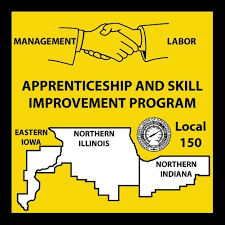Apprentices have a long history dating back to ancient Greece when young workers entered a term of service, now called indentureship, to a skilled tradesperson to learn a craft. Things are much the same today. Currently, an apprentice is an employee who learns a skilled trade through planned, supervised work on-the-job, while at the same time receiving related technical classroom instruction. Apprentices are required to sign an indenture agreement with their Joint Apprenticeship Committee/Trade Improvement Committee that outlines the requirements and expectations of an apprentice Operating Engineer.
Apprentices are taught the proper use, care, and safe handling of the equipment used in connection with their work and, of course, the important skills necessary to become a successful Operator.
While working on-the-job and acquiring skills, apprentices are a regular part of the work force on whom contractors and co-workers rely. Apprentices are also required to attend classes and complete the prescribed courses related to the trade in order to complement their on-the-job training. If the on-the-job or school work is not satisfactory, they may be dropped from the program or sent back to repeat that segment of training.
